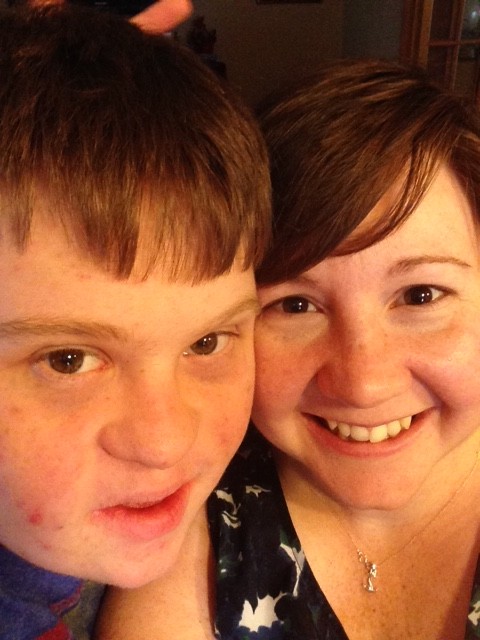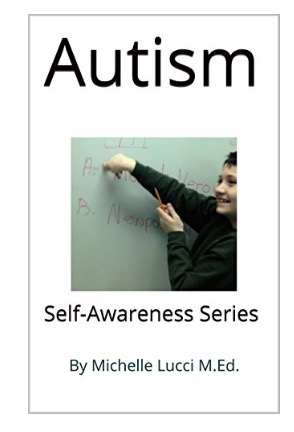As readers know I’m a sucker for social media and digital technology.
Here are a few apps to helps children, teachers and parents with special needs education.
Do you know of any others?
Why not tell us more in the comments box below?
Thanks in advance!
Autism and Down Syndrome: Self-Awareness Series – Find out more about these important books by Michelle Lucci
My name is Michelle Lucci, and I am a sibling of someone with special needs. My brother, Tony, has Down Syndrome, and he inspired me to become a special education teacher. I earned my bachelor’s degree from Franciscan University as an Intervention Specialist and my master’s degree from West Virginia University in Multiple and Severe Disabilities. I taught middle school students with special needs for five years before my health forced me to retire. Now I use my skills and education to write textbooks and make educational materials for students with significant disabilities.
The Self-Awareness Series are books written to start a conversation between an adult and an individual with special needs. The books are written as clearly and gently as possible to promote positive self-esteem, as well as self-acceptance and awareness of weaknesses. They can also be used in special education classrooms for learning how to use reference books.
Growing up, my parents didn’t talk to my brother Tony about his disability. As a result of my education and experience teaching, I realized it would benefit my brother if my parents were to talk to him about his disability. I encouraged my parents to do so, but they were not sure why we should tell him he has Down Syndrome if he isn’t aware.
Think about it this way. Let’s say you have trouble doing something. If you understand why it is challenging for you, you can identify and label the weakness, and as a result, you can strengthen it by finding solutions that help you adapt. For example, I struggle with spelling. Because I have identified that weaknesses, I have found solutions to adapt. I use spell check, ask Siri to spell words for me, and when in doubt, I use a synonym.
Our loved ones often attend their IEP meetings at school as quiet guests and don’t really understand what is going on or why they are there. If they understand their disability and their weaknesses, they can understand why the adults in their life are working on a plan to help them be successful in school.
Knowledge is power. It is important for our loved ones to have awareness of their own disabilities. If they are able to identify and understand their weaknesses, then it promotes control over their lives and positive self-esteem. If they understand why they are different and that there is a reason for why they are the way they are, then they can focus on their strengths, talents, and what makes them special!
The books are available on Kindle. http://www.amazon.com/s/ref=sr_nr_seeall_3?rh=k%3AMichelle+Lucci%2Ci%3Adigital-text&keywords=Michelle+Lucci&ie=UTF8&qid=1461083241
The Anatomy of a Special Needs Child
As many regular readers will have noticed special needs gets quite a bit of coverage oc children with special needs.
Not surprising given I’m the father of a son on the autism spectrum.
But, of course, it is not the only game in town.
This was why I am so please to share this graphic with you which introduces other types of common special needs in children.
They include arthritis, ADHD, and multiple sclerosis among others.

Find more education infographics on e-Learning Infographics
Music and autism – 5 reasons why music can help children with special needs!
Last week we ran a blog post looking at music therapy for children on the autism spectrum.
So I was very interested to read this fascinating note from The Rhythm Tree web site. You can check them out here
Please include attribution to wwwwww.TheRhythmTree.com with this graphic.
Please include attribution to wwwwww.TheRhythmTree.com with this graphic.
| HeatherLynn4 | Thank you so much for sharing and bringing to light the wonderful things that music (especially MUSIC THERAPY) can bring to people on the Autism spectrum! I am a board-certified music therapist on Long Island, specializing in Autism and developmental disabilities in children and young adults. I have the pleasure of sharing and engaging in therapeutic musical activities with children and teens everyday, and get to see the direct impact it has on their lives. Not only does music bring enjoyment into people’s lives, but for some…it can bring out language, socialization and motor skills that never existed before. It is an EVIDENCE-BASED practice in which a board-certified music therapist can assess the client’s individualized needs and provide musical interventions to assist in reaching goals. I have personally seen the look on a parent’s face during a music therapy session when her child says their very first word at 5 years old. You can’t beat that! Music is a motivator for us all. It only makes sense! If you’re interested in more information, please feel free to check out my website at: http://www.therapeuticmusicinfo.com or go to http://www.musictherapy.org for more detailed information on how music therapy can help your child with ASD! You can even search for a board-certified music therapist in your area! If you live in the New York/Long Island area, check out http://www.familycenterforautism.org to sign up for a trial music class with me! 🙂 |
Special Needs Children and Common Core. Is Common Core effective for children with special needs such as autism? Please take part in our discussion blog.
Special Needs Children and Common Core. Is Common Core effective for children with special needs such as autism?
As some of my more regular readers with know I have been running an occasional blog post series called autism and education. You can here the previous posts here.
As the father of an eight year old boy on the autism spectrum I take the whole issue of special needs education very seriously. So I was very interested in the whole area of Common Core State Standards Initiative and how (if at all) it benefits those students, such as my son John, with special needs.
To those not based in the USA (where the Common Core curriculum is used in the vast majority of states) the initiative is defined as “an educational assembly in the United States that details what K-12 students should know in English language arts and mathematics at the end of each grade. The initiative is sponsored by the National Governors Association (NGA) and the Council of Chief State School Officers (CCSSO) and seeks to establish consistent educational standards across the states as well as ensure that students graduating from high school are prepared to enter credit-bearing courses at two- or four-year college programs or to enter the workforce.”
So, in fact, it does have some similarities with the UK’s national curriculum.
Okay so how does this impact upon those students who have special needs?
Last week I asked our online discussion group AutismTalk if they felt that Common Core was suitable for student with special needs ( and children on the sutism spectrum in particular). I have to say that I found the results quite remarkable.
First of all the sheers numbers who replied suggest the subject is of great interest. Secondly the almost negative view of Common Core from our members.
Angela is pretty typical when she says “My 10 yo aspergers son is highly intelligent, has 136 IQ and he has meltdowns because he doesn’t feel it’s necessary to show three ways to get the answer for one problem. I doesn’t not set well with children with ASD…they want to answer a problem and move on. It boggles my mind why they do this in schools. Our children don’t need common core system…get rid of it!!!”
“I think Common Core for all children is useless. No child can be a “cookie-cutter kid”, especially not a special needs child. Thankfully my son is in a specialized classroom so he isn’t subjected to it. But, my two mainstream daughters are, and there are mainstream kids struggling with this new system because all kids learn differently.” is Nicole’s view.
But, on the other side, Marilee felt “common core hasn’t been here in NY that long and I am all for it. Because I’ve seen how much easier this pain in the $$$ way makes the transition to high school and college math. So while more steps are taken now, the math most kids get to and fail are easily learned because of the extra steps. Of course parents need to utilize common core classes so their able to help with homework and their own comprehension.”
Because of this I do think it is of value to open up the discussion a bit further.
So what do you think of Common Core?
It would be great if you could use this blog to share your thoughts and comment on the views of others. To do so please use the comments section here.
As always we would ask you to be charitable in your dealings with others on this important matter.
Many thanks in advance!





